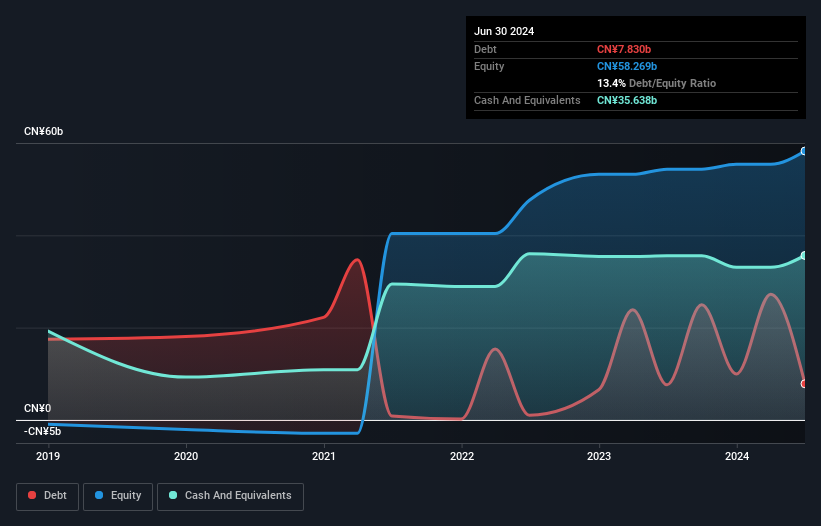
Howard Marks put it nicely when he said that, rather than worrying about share price volatility, 'The possibility of permanent loss is the risk I worry about... and every practical investor I know worries about.' So it might be obvious that you need to consider debt, when you think about how risky any given stock is, because too much debt can sink a company. We note that JD Logistics, Inc. (HKG:2618) does have debt on its balance sheet. But the real question is whether this debt is making the company risky.
Why Does Debt Bring Risk?
Debt assists a business until the business has trouble paying it off, either with new capital or with free cash flow. If things get really bad, the lenders can take control of the business. However, a more frequent (but still costly) occurrence is where a company must issue shares at bargain-basement prices, permanently diluting shareholders, just to shore up its balance sheet. Of course, debt can be an important tool in businesses, particularly capital heavy businesses. The first thing to do when considering how much debt a business uses is to look at its cash and debt together.
Check out our latest analysis for JD Logistics
How Much Debt Does JD Logistics Carry?
As you can see below, JD Logistics had CN¥7.83b of debt, at June 2024, which is about the same as the year before. You can click the chart for greater detail. But on the other hand it also has CN¥35.6b in cash, leading to a CN¥27.8b net cash position.

How Strong Is JD Logistics' Balance Sheet?
We can see from the most recent balance sheet that JD Logistics had liabilities of CN¥35.2b falling due within a year, and liabilities of CN¥17.9b due beyond that. Offsetting these obligations, it had cash of CN¥35.6b as well as receivables valued at CN¥15.4b due within 12 months. So its liabilities outweigh the sum of its cash and (near-term) receivables by CN¥2.12b.
Given JD Logistics has a market capitalization of CN¥53.9b, it's hard to believe these liabilities pose much threat. Having said that, it's clear that we should continue to monitor its balance sheet, lest it change for the worse. While it does have liabilities worth noting, JD Logistics also has more cash than debt, so we're pretty confident it can manage its debt safely.
Although JD Logistics made a loss at the EBIT level, last year, it was also good to see that it generated CN¥3.8b in EBIT over the last twelve months. The balance sheet is clearly the area to focus on when you are analysing debt. But it is future earnings, more than anything, that will determine JD Logistics's ability to maintain a healthy balance sheet going forward. So if you want to see what the professionals think, you might find this free report on analyst profit forecasts to be interesting.
Finally, while the tax-man may adore accounting profits, lenders only accept cold hard cash. While JD Logistics has net cash on its balance sheet, it's still worth taking a look at its ability to convert earnings before interest and tax (EBIT) to free cash flow, to help us understand how quickly it is building (or eroding) that cash balance. Over the last year, JD Logistics actually produced more free cash flow than EBIT. There's nothing better than incoming cash when it comes to staying in your lenders' good graces.
Summing Up
We could understand if investors are concerned about JD Logistics's liabilities, but we can be reassured by the fact it has has net cash of CN¥27.8b. The cherry on top was that in converted 380% of that EBIT to free cash flow, bringing in CN¥14b. So is JD Logistics's debt a risk? It doesn't seem so to us. Another factor that would give us confidence in JD Logistics would be if insiders have been buying shares: if you're conscious of that signal too, you can find out instantly by clicking this link.
At the end of the day, it's often better to focus on companies that are free from net debt. You can access our special list of such companies (all with a track record of profit growth). It's free.
New: Manage All Your Stock Portfolios in One Place
We've created the ultimate portfolio companion for stock investors, and it's free.
• Connect an unlimited number of Portfolios and see your total in one currency
• Be alerted to new Warning Signs or Risks via email or mobile
• Track the Fair Value of your stocks
Have feedback on this article? Concerned about the content? Get in touch with us directly. Alternatively, email editorial-team (at) simplywallst.com.
This article by Simply Wall St is general in nature. We provide commentary based on historical data and analyst forecasts only using an unbiased methodology and our articles are not intended to be financial advice. It does not constitute a recommendation to buy or sell any stock, and does not take account of your objectives, or your financial situation. We aim to bring you long-term focused analysis driven by fundamental data. Note that our analysis may not factor in the latest price-sensitive company announcements or qualitative material. Simply Wall St has no position in any stocks mentioned.
About SEHK:2618
JD Logistics
An investment holding company, provides integrated supply chain solutions and logistics services in the People’s Republic of China.
Flawless balance sheet and undervalued.

